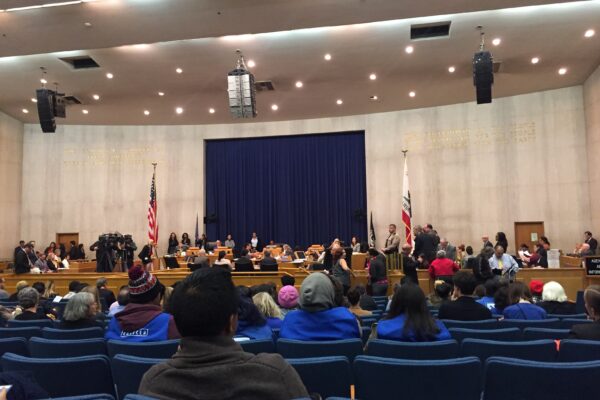Your local governing bodies — including your county board of supervisors, city councils and school district boards as well as many of their subsidiary boards and commissions — exist to do the business of the public. They serve you.
Accordingly, their meetings must be open to the public and allow you, as a member of the public, an opportunity to express your opinions during the meeting. You need not register, give your name or complete or show any documentation to attend or participate.
Local government bodies must also provide an agenda listing the items that will be discussed, no later than 72 hours in advance of the meeting. You can usually obtain information about their meeting calendar and agendas of upcoming meetings on their websites. The governing body may not vote on issues not on the agenda or without providing members of the public with an opportunity to comment on the agenda item prior to their vote, except in an emergency.
Public Participation
You have the right to directly address the local government body at specified times during the meeting.
- You have the right to speak about agenda items before or during the government body's consideration of the item.
- You have the right to speak about any matter not on the agenda, so long as it relates to an issue in which the governing body has some authority to act. For example, the local government body may restrict you expressing your support or criticism of the Affordable Care Act, but they may not restrict you expressing your request that they support a resolution that supports or criticizes the Affordable Care Act.
"Consent Calendar"
The "Consent Calendar" consists of agenda items that the governing body believes are routine and/or do not require discussion. The body may take the recommended actions on these items in one vote, without further discussion. But it must provide you an opportunity to comment on those items before it takes such action.
Public Criticism
- You have the right to criticize the agency, its officials, or its policies, practices, acts, or omissions.
- The government may place reasonable time limits on public speech. But they may not prohibit, restrict or otherwise limit your speech during your allotted time, unless you are significantly disrupting the orderly progress of the meeting.
- You MAY be found to be disrupting the meeting if you go over your allotted time, speak on matters that are not within the jurisdiction of the body, or are unduly repetitive.
- You are NOT disrupting the meeting simply for criticizing the government, or for your choice of words in doing so.
- You are NOT disrupting the meeting simply because your speech provokes a reaction from the audience or the governing body. You may be punished for incitement ONLY if you specifically advocate illegal action, and ONLY if that illegal action is imminently likely to occur.
- The governing body may not punish you, restrict your speech, or take any other adverse action against you based on the viewpoint you have expressed or the content of your speech.
- You may record, take photographs of or broadcast any open and public meeting, unless doing so causes a persistent disruption of the meeting.
- You have the right to obtain copies of any agendas or other writings considered by the governing body, as well as any government recordings of the meeting if requested within 30 days of the recording.
- The government may prohibit you from bringing in signs that may disrupt the meeting because they are large and may block people's view of the meeting. However, the government cannot prohibit you from bring in small signs, or wearing T-shirts, hats or pins/buttons that express a message.
Related Content

ACLU Sues the OC Board of Supervisors for Unlawfully Stifling Dissent
Stay Informed
Sign up to be the first to hear about how to take action.
By completing this form, I agree to receive occasional emails per the terms of the ACLU’s privacy statement.
By completing this form, I agree to receive occasional emails per the terms of the ACLU’s privacy statement.


